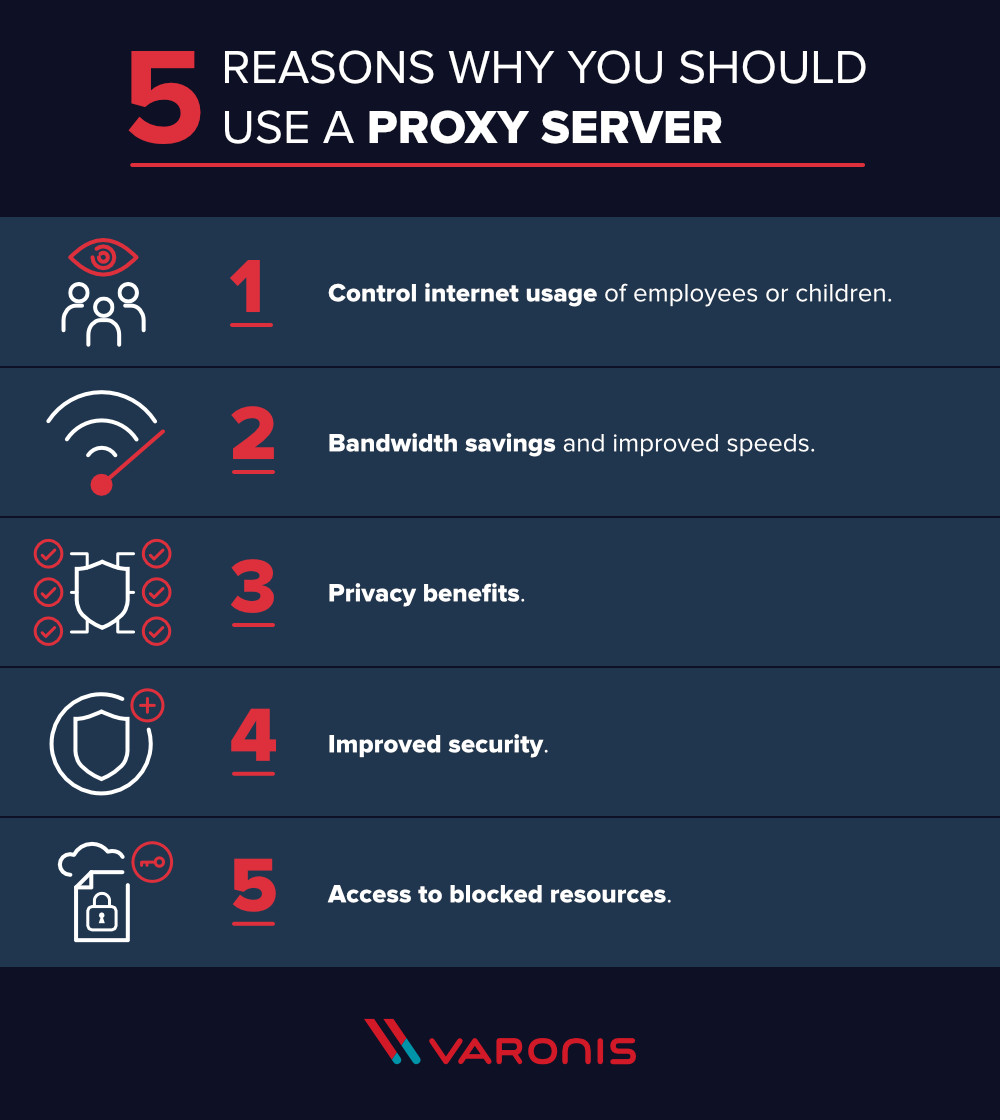The internet has become an indispensable part of modern life, connecting us to a wealth of information, entertainment, and opportunities. Yet, the intricate workings of this vast network often remain a mystery to the average user. While we enjoy seamless access to social media, news updates, and online shopping, the underlying processes that ensure our data security and privacy are often overlooked. This lack of awareness can be risky, especially with increasing concerns about data breaches and identity theft.
When you browse the web, your online activity takes a specific path. You might be unknowingly utilizing a proxy server at your workplace, through a Virtual Private Network (VPN), or perhaps you’re proactively using a proxy server for enhanced control over your internet connection.
In this article, we will delve into the world of proxy servers, explaining what they are, how they function, and why they are crucial for online security and privacy.
Understanding the Basics: What is a Proxy Server?
At its core, a proxy server functions as an intermediary between your computer and the internet. Imagine it as a gateway that stands between you, the end-user, and the websites you intend to visit. Proxy servers offer varying degrees of functionality, security, and privacy, tailored to specific needs and contexts, whether for personal use, business requirements, or adherence to company policies.
When you employ a proxy server, your internet traffic is routed through this server before reaching its intended destination on the internet. The request you initiate first goes to the proxy server, which then forwards it to the website. The website’s response follows the reverse path, returning to the proxy server, and subsequently, the proxy server delivers the data back to your computer.
This might prompt the question: if data simply passes through, what is the real advantage of using a proxy server? Why not connect directly to websites without this extra step?
Modern proxy servers offer a range of sophisticated functionalities that extend far beyond simple request forwarding. They play a vital role in bolstering data security, optimizing network performance, and enhancing online privacy. In essence, proxy servers act as a firewall and web filter, facilitate shared network connections, and employ caching mechanisms to accelerate access to frequently visited websites. A robust proxy server is designed to shield users and internal networks from potential threats lurking on the internet, while also providing a significant layer of privacy.

Diagram illustrating the concept of a proxy server acting as an intermediary between a user and the internet, highlighting its role in security and privacy.
Delving into the Mechanism: How Does a Proxy Server Operate?
To understand how a proxy server works, it’s essential to grasp the concept of IP addresses. Every device connected to the internet is assigned a unique Internet Protocol (IP) Address. Think of this IP address as your computer’s digital street address. Just as postal services rely on street addresses to deliver mail, the internet uses IP addresses to ensure data is routed to the correct computers.
A proxy server is essentially another computer on the internet, possessing its own distinct IP address that your computer recognizes. When you initiate a web request, instead of going directly to the website, your request is first directed to the proxy server. The proxy server then takes over, forwarding your web request on your behalf. It receives the response from the web server and then relays the webpage data back to you, allowing you to view the page in your browser.
Crucially, when the proxy server forwards your web requests, it has the capability to modify the data you send while still ensuring you receive the intended information. A proxy server can mask your original IP address, effectively concealing your location from the web server. It can encrypt your data, rendering it unreadable to any potential eavesdroppers during transmission. Furthermore, a proxy server can be configured to block access to specific web pages based on IP addresses or content filters.
Unveiling the Advantages: Why Should You Use a Proxy Server?
Organizations and individuals employ proxy servers for a multitude of compelling reasons, all centered around control, performance, privacy, and security.
-
Controlling Internet Usage: Businesses and parents leverage proxy servers to manage and monitor internet access for employees or children. Companies can restrict access to specific websites deemed unproductive or inappropriate during work hours. Proxy servers can be configured to deny access or redirect users with notifications. Moreover, they can log and monitor all web requests, providing insights into browsing habits, even on unblocked sites.
-
Bandwidth Optimization and Enhanced Speed: Proxy servers can significantly improve network performance, especially within organizations. They achieve this through caching, where frequently accessed website content is stored locally on the proxy server. When a user requests a popular website, the proxy server checks its cache for the most recent version. If available, it serves the cached copy, reducing the need to fetch the data from the origin server. This drastically reduces bandwidth consumption and speeds up loading times, particularly when numerous users access the same websites concurrently.
-
Privacy Enhancement: For individuals and organizations concerned about online privacy, proxy servers offer a valuable layer of protection. Certain proxy servers are designed to alter the IP address and other identifying information embedded in web requests. This prevents destination servers from identifying the origin of the request, making it harder to track personal information and browsing habits.
-
Security Fortification: Beyond privacy, proxy servers contribute significantly to online security. They can be configured to encrypt web requests, safeguarding sensitive data from interception. Proxy servers can also act as a barrier against known malware sites, preventing access and potential infections. Organizations often integrate proxy servers with Virtual Private Networks (VPNs) to ensure secure remote access. A VPN establishes a secure, encrypted connection to the company network, allowing remote users to access resources securely through the company’s proxy server, protecting both user access and company data.
-
Accessing Geo-Restricted Content: Proxy servers empower users to bypass content restrictions imposed by geographical location, companies, or governments. For instance, if a sporting event is blacked out in your region, connecting through a proxy server located elsewhere can circumvent this restriction. By masking your actual IP address and presenting an IP address from a different location, proxy servers can provide access to content that would otherwise be unavailable. In regions with stringent internet censorship, proxy servers can offer citizens a gateway to an uncensored online experience.
Navigating the Risks: Potential Downsides of Proxy Servers
While proxy servers offer numerous benefits, it’s crucial to be aware of potential risks associated with their use. Choosing a reputable and secure proxy server is paramount to avoid negating the intended advantages.
-
Browsing History Logging: A significant risk lies in the potential logging of browsing history. Proxy servers, by their nature, process your web requests and may store information such as your original IP address and browsing activity. It’s essential to investigate the logging policies of your proxy server provider, including data retention practices and cooperation with law enforcement. If privacy is a primary concern, using a proxy server that logs and potentially sells your data would be counterproductive.
-
Lack of Encryption: Using a proxy server without encryption can severely compromise your security. Without encryption, your web requests are transmitted as plain text, making sensitive information like usernames, passwords, and account details easily accessible to anyone monitoring the connection. Always ensure that your chosen proxy server offers robust encryption capabilities to protect your data in transit.
Exploring the Variety: Types of Proxy Servers
Not all proxy servers are created equal. They differ in their functionalities and levels of anonymity. Understanding these distinctions is crucial for selecting a proxy server that aligns with your specific needs.
-
Transparent Proxy: As the name suggests, a transparent proxy is upfront about its presence. It identifies itself as a proxy server to websites and also passes along your original IP address. Transparent proxies are often employed by businesses, libraries, and schools for content filtering purposes due to their ease of implementation on both client and server sides.
-
Anonymous Proxy: An anonymous proxy identifies itself as a proxy server but takes steps to conceal your IP address from websites. This enhances privacy and helps prevent identity theft and targeted advertising based on location. By masking your IP address, anonymous proxies limit the ability of websites to track your precise location for ad targeting, although it’s not a foolproof method.
-
Distorting Proxy: A distorting proxy goes a step further by not only identifying as a proxy but also providing a false IP address. This serves similar privacy purposes as anonymous proxies, but by presenting a misleading IP address, it allows users to appear to be accessing the internet from a different location. This can be useful for bypassing geographical content restrictions.
-
High Anonymity Proxy (Elite Proxy): High anonymity proxies, also known as elite proxies, offer the highest level of privacy and anonymity. They do not identify themselves as proxies and do not transmit your original IP address. To websites, traffic from a high anonymity proxy appears to originate from a regular internet user, making it very difficult to trace back to the actual user.
Proxy servers have gained increased attention amidst discussions surrounding topics like Net Neutrality and censorship. The erosion of net neutrality principles has raised concerns about Internet Service Providers (ISPs) potentially controlling bandwidth and internet traffic, potentially dictating online access. In this evolving landscape, proxy servers may offer a means to circumvent ISP restrictions and maintain a more open and accessible internet experience.
Varonis leverages data from proxy servers as part of its comprehensive approach to data security and cyberattack prevention. Analyzing proxy server data provides valuable context for understanding user behavior patterns and detecting anomalies. This enables proactive alerts for suspicious activities, empowering organizations to investigate and respond to potential security incidents effectively.
For instance, while a user accessing GDPR-related data might not be inherently suspicious, if this access is followed by an attempt to upload that data to an external website, it could indicate a data exfiltration attempt and a potential data breach. By integrating proxy monitoring with file system monitoring and threat intelligence, security solutions like Varonis can provide a holistic view, enabling timely detection and prevention of data breaches.
To witness these threat detection capabilities in action and explore the insights your proxy data can reveal, consider requesting a 1:1 demo.
Frequently Asked Questions: Proxy Servers
Proxy Server Definition
A proxy server is an intermediary server that acts as a gateway between different networks or services, managing and routing traffic.
What is a proxy server used for?
Proxy servers serve diverse purposes, encompassing functionality, security, and privacy enhancements. They are used to control employee internet usage, optimize bandwidth for faster connectivity, balance network load, and access geographically restricted resources.
Is a VPN a proxy?
Virtual Private Networks (VPNs) are a specialized implementation of proxy server technology. While a standard proxy server manages network traffic, a VPN extends its capabilities by encrypting the data transmitted through the connection, providing an added layer of security. For a deeper understanding, explore our comparative article on Proxy vs VPN.
What is an example of a proxy server?
Numerous proxy server types exist. The TOR Network stands out as a prominent example, offering a high degree of privacy and anonymity for users browsing the internet through its network.
What are the benefits of a proxy server?
The key benefits of using a proxy server include:
- Controlling and monitoring employee internet access.
- Saving bandwidth and improving network speeds through caching.
- Enhancing privacy by masking your IP address and personal information.
- Improving security by encrypting web requests and filtering malicious content.
- Gaining access to blocked resources and bypassing geographical restrictions.

